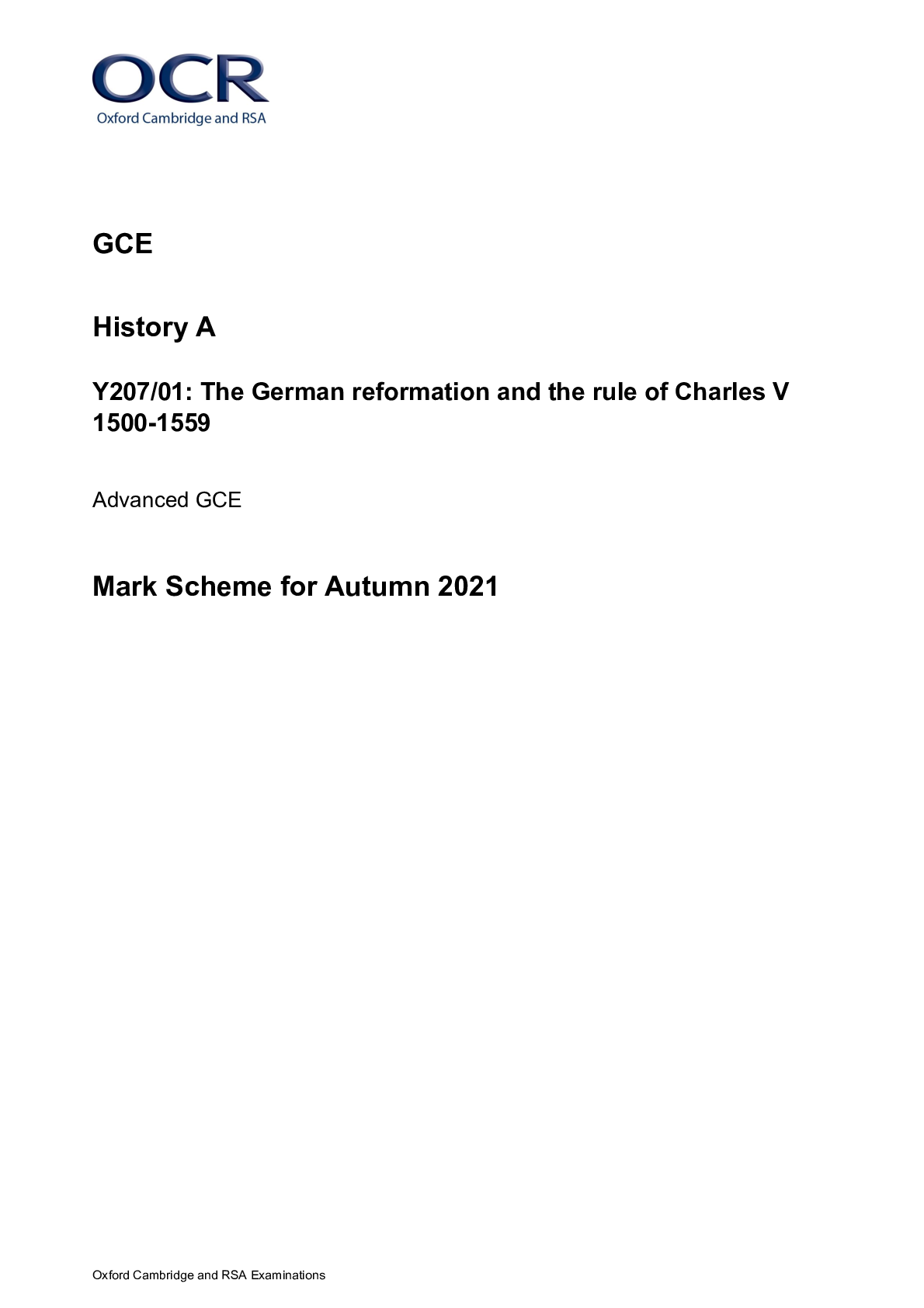History > A/As Level Mark Scheme > GCE History A Y207/01: The German reformation and the rule of Charles V 1500-1559 Advanced GCE Mark (All)
GCE History A Y207/01: The German reformation and the rule of Charles V 1500-1559 Advanced GCE Mark Scheme for Autumn 2021. 100% Pass Rate
Document Content and Description Below
Subject Specific Marking Instructions Question Answer Mark Guidance 1 (a) Which of the following had a greater impact on Protestantism in Germany? i. The Battle of Mühlberg (1547) ii. The Augsbu... rg Interim (1548) Explain your answer with reference to both (i) and (ii). • In dealing with the Battle of Mühlberg answers might consider that this was a victory for Charles V and his Catholic allies. • Answers might consider that it led to the capture of Protestant leaders including Philip of Hesse. • Answers might consider that the victory theoretically placed Charles in a position to force peace terms on the members of the Schmalkaldic League. • In dealing with the Augsburg Interim answers might consider that it intended to restore Catholicism with some minor religious concessions to Protestants. • Answers might consider that it was not accepted, which led to the alliance of Protestant princes with France and a renewal of hostilities. • Answers might consider that its failure ultimately meant that Charles V had to guarantee religious freedom for Lutherans. 10 • No set answer is expected • Judgement must be supported by relevant and accurate material. • Only credit material relevant to the impact on the position of Protestantism in Germany. • Answers may deal with each factor in turn, then compare them to reach a judgement, or may take a continually comparative approach. Either approach is acceptable. • Knowledge must not be credited in isolation, it should only be credited where it is used as the basis for analysis and evaluation, in line with descriptions in the levels mark scheme. 1 (b)* ‘Charles V was largely unsuccessful in his dealings with the Ottomans and their allies.’ How far do you agree? In arguing that Charles was unsuccessful, answers might consider: 20 • No set answer is expected. • At higher levels candidates will focus on ‘how far’, but at Level 4 may simply list the successes and failures. • At Level 5 and above there will be judgement as to the relative degree of success/failure. • At higher levels candidates might establish criteriaY207/01 Mark Scheme October 2021 4 • The rapid expansion of Ottoman control in the Mediterranean and Eastern Europe during his reign. • Specific strategically important losses such as the Fall of Rhodes (1523), defeat at Algiers (1541), or Tripoli (1551). • His failure to lead a crusade against the Turks, as he desired to do. • His difficulties in dealing with Barbary raids and his failure to defeat Barbarossa. • The weaknesses of the Spanish fleet as compared to the Ottoman one. • The impact the Ottoman issue had on his political authority elsewhere in the empire, and the impact issues elsewhere in the empire had on his ability to wage war on the Ottomans. In arguing that Charles did have successes, answers might consider: • The capture of La Goletta and Tunis in 1535, plus the capture of most of Barbarossa’s fleet. • Charles’ alliance with the Venetians and the Pope against the Ottomans. • He was able to hold off further Turkish advance in the Mediterranean after c.1551. • Ferdinand was made to bear the weight of defending Hungary, thus avoiding further commitment of resources. • Success at the Battle of Guns in 1532 in holding back the Ottoman advance into Eastern Europe. • The diminution of the Ottoman threat by the end of the reign. against which to judge success. • To be valid judgements, claims must be supported by relevant and accurate material. If not, they are assertions. • Knowledge must not be credited in isolation, it should only be credited where it is used as the basis for analysis and evaluation, in line with descriptions in the levels mark scheme.Y207/01 Mark Scheme October 2021 5 2 (a) Which of the following was a more significant problem for Charles V when he was elected Holy Roman Emperor in 1519? i. The structure and state of the Holy Roman Empire ii. The 95 Theses of 1517 and reactions to them Explain your answer with reference to both (i) and (ii). • In dealing with the structure and state of the Holy Roman Empire answers might consider the problem of internal disunity. • Answers might consider the power of the Princes. • Answers might consider the connection between the political state of the Empire and the appeal of Lutheranism to some princes. • In dealing with the 95 Theses and reactions to them answers might consider that the 95 Theses were highly critical of the Roman Catholic Church, which Charles V was charged to defend. • Answers might consider that knowledge of, and support for, Luther’s ideas began to spread rapidly. • Answers might consider that Luther’s actions and reactions to them forced Charles to respond, distracting him from other commitments. 10 • No set answer is expected • Judgement must be supported by relevant and accurate material. • Only credit material relevant to problems in the Holy Roman Empire circa 1519. • Answers may deal with each factor in turn, then compare them to reach a judgement, or make take a continually comparative approach. Either approach is acceptable. • Knowledge must not be credited in isolation, it should only be credited where it is used as the basis for analysis and evaluation, in line with descriptions in the levels mark scheme. • Candidates might choose to bring in appropriate specific evidence that dates prior to 1519 to evidence a valid point about his inheritance in 1519. 2. (b)* Assess the reasons why there was no lasting peace with France during the reign of Charles V. In arguing that it was due to political rivalry, answers might consider: • The personality and personal priorities of Charles V. • The personality and personal priorities of Francis I, and later Henry II. • Issues of reputation and prestige. • The significance of Charles being appointed Holy 20 • No set answer is expected. • At higher levels candidates will focus on ‘assess’, but at Level 4 may simply list the reasons. • At Level 5 and above there will be judgement as to the relative significance of reasons. • At higher levels candidates might establish criteria against which to judge. • To be valid judgements, claims must be supported by relevant and accurate material. If not, the [Show More]
Last updated: 2 years ago
Preview 1 out of 10 pages

Buy this document to get the full access instantly
Instant Download Access after purchase
Buy NowInstant download
We Accept:

Also available in bundle (1)

OCR HISTORY BUNDLE.. All question papers and answers. Graded A. Deeply Discounted.
OCR HISTORY BUNDLE.. All question papers and marking schemes.. Graded A. Deeply Discounted.
By SupremeDocs 3 years ago
$50
41
Reviews( 0 )
$12.00
Can't find what you want? Try our AI powered Search
Document information
Connected school, study & course
About the document
Uploaded On
Jun 28, 2022
Number of pages
10
Written in
Additional information
This document has been written for:
Uploaded
Jun 28, 2022
Downloads
0
Views
156






















